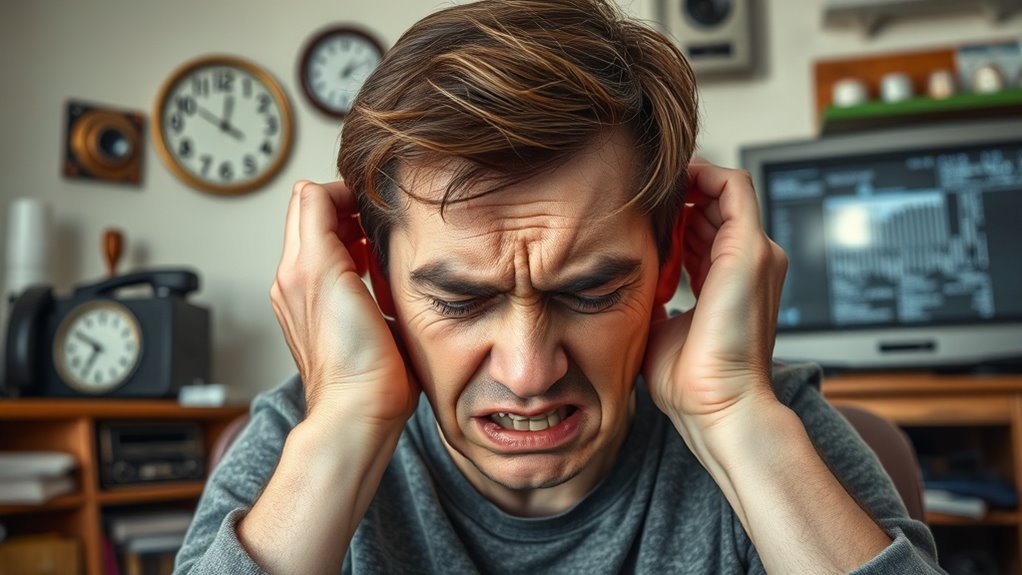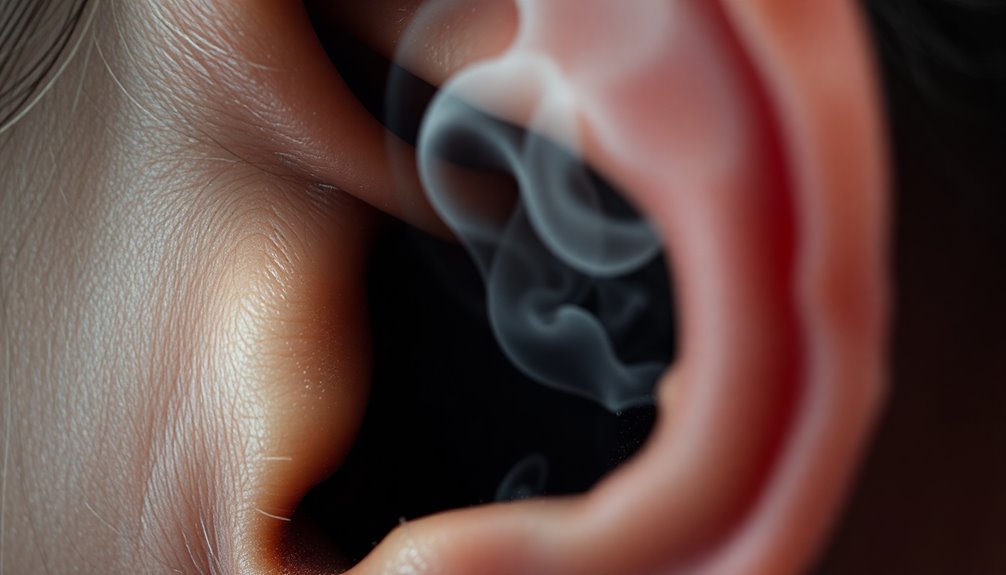If you find that everyday sounds like conversations, traffic, or appliances hurt or overwhelm you, you might have hyperacusis, a neurological condition causing sound sensitivity. It occurs when your ears or brain react too strongly to normal noise levels, leading to pain, discomfort, or a desire to escape sounds. Managing this involves understanding your triggers, protecting your hearing, and exploring techniques to build tolerance. Keep exploring to learn how you can effectively cope with and improve your sound sensitivity.
Key Takeaways
- Hyperacusis causes normal sounds to feel painfully loud due to abnormal auditory system responses.
- Common triggers include conversations, traffic, appliances, and even soft noises like humming or typing.
- Managing hyperacusis involves sound protection, gradual exposure, relaxation techniques, and creating calming environments.
- Diagnosis is done by audiologists through hearing tests and symptom tracking to assess sound sensitivity.
- Support from professionals and support groups can help improve coping strategies and reduce discomfort.
Understanding Hyperacusis: The Basics of Sound Sensitivity

Hyperacusis is a condition where everyday sounds feel unbearably loud or painful, even though they are typically harmless to others. When you have hyperacusis, your ears become more sensitive to sounds, causing discomfort or pain in response to normal noises. This heightened sensitivity results from an abnormal response in your auditory system, which may involve your ear structures or brain processing. It’s not simply about being easily startled; it’s a real neurological issue affecting how your ears interpret sound signals. The condition can develop suddenly or gradually, often linked to noise exposure, injuries, or underlying health conditions. Understanding this basic aspect of hyperacusis helps you recognize that your discomfort is rooted in a genuine sensory sensitivity, not just a heightened emotional reaction. Using air purifiers to reduce background noise and improve indoor sound quality can sometimes help manage discomfort caused by hyperacusis.
Common Triggers and Symptoms of Hyperacusis

You might notice signs of sensory overload, like feeling overwhelmed or anxious after loud noises. Everyday sounds such as conversations, alarms, or traffic can quickly become unbearable. Recognizing these triggers and symptoms helps you better understand your hyperacusis and manage your reactions. Additionally, understanding sound sensitivity can guide you to take appropriate steps to minimize discomfort and protect your hearing health.
Sensory Overload Signs
Sensory overload is a common experience for individuals with hyperacusis, often triggered by loud or sudden noises that seem harmless to others. When this happens, you might feel overwhelmed or anxious, even in everyday environments. Recognizing these signs can help you manage your reactions better. You may notice:
- Feeling a need to escape or cover your ears when exposed to certain sounds
- Sudden irritability or emotional outbursts in noisy settings
- Physical symptoms like headaches, dizziness, or a racing heart during sound overload
- Engaging in practices such as meditation can help improve your emotional regulation and resilience against sensory overloads enhancing emotional regulation.
These signs indicate that your auditory system is overwhelmed, and your body is reacting to the excessive sensory input. Being aware of these cues allows you to take proactive steps to protect yourself and reduce distress.
Everyday Sound Triggers
Many everyday sounds that seem harmless to others can trigger discomfort and sensory overload in individuals with hyperacusis. Common triggers include loud conversations, background noises like traffic or appliances, and sudden sounds such as door slams or sirens. Even softer noises like typing or humming can become overwhelming if your sensitivity is heightened. You might notice that certain triggers cause pain, a feeling of fullness, or an intense desire to escape the noise. These sounds often lead to increased stress and anxiety, making daily activities challenging. Recognizing your specific triggers is vital for managing your condition. Understanding regional resources can help you access support and strategies tailored to your environment. By understanding which sounds set off your symptoms, you can take steps to avoid or minimize exposure, helping you regain control over your environment.
Potential Causes and Risk Factors

Your risk of developing hyperacusis can increase from exposure to loud noises that damage your hearing. Medical conditions and genetic factors also play a role in making some people more susceptible. Understanding these causes can help you take steps to protect your ears and manage symptoms effectively. For example, being aware of Forsale 100 can inform your choices when shopping for soundproofing or hearing protection devices.
Noise-Induced Damage Risks
Noise-induced damage to the auditory system occurs when exposure to loud sounds overwhelms the ear’s natural defenses, leading to potential harm. You might not realize how quickly your ears can be affected, especially in noisy environments. Repeated or intense exposure can cause permanent damage, increasing your risk of hyperacusis. Factors that elevate your risk include:
- Listening to music at high volumes through headphones
- Attending loud concerts or events without protection
- Working in noisy environments without proper ear protection
These risks accumulate over time, making it essential to protect your ears. The louder and longer your exposure, the greater the chance of damaging your hearing system. Being aware of these risks helps you take steps to preserve your hearing health and avoid hyperacusis. Additionally, understanding Gold IRA Rollovers can be useful for diversifying your retirement investments and safeguarding your financial future.
Medical and Genetic Factors
In addition to environmental factors, certain medical conditions and genetic predispositions can increase the likelihood of developing hyperacusis. For example, neurological disorders like migraines or traumatic brain injuries can alter how your brain processes sound, making everyday noises feel painfully loud. Ear infections, tinnitus, and conditions such as Lyme disease also play a role by affecting auditory pathways. Genetics can influence your susceptibility; if hyperacusis runs in your family, you’re more likely to develop it. Some inherited traits may affect how your nervous system reacts to ordinary sounds. Recognizing these medical and genetic factors helps you understand that hyperacusis isn’t solely caused by external noise exposure but can also stem from internal biological vulnerabilities. Additionally, the increasing use of automation technologies in medical diagnostics and treatment can aid in better understanding and managing these underlying conditions. Addressing these underlying issues can be *vital* for effective management and treatment.
Diagnosing Hyperacusis: What to Expect

Diagnosing hyperacusis typically involves a thorough assessment by an audiologist or ear specialist to determine how sensitive your hearing is to everyday sounds. During the evaluation, you’ll likely undergo a series of tests to measure your hearing thresholds and reactions to various noises. These tests help identify if your sound tolerance is abnormally low. You might also be asked to keep a diary of your symptoms to track when and how sounds affect you. Be prepared for a detailed conversation about your hearing history and any related issues. The goal is to pinpoint the severity of your hyperacusis and rule out other conditions. Additionally, some practitioners may utilize sound sensitivity assessments to quantify your discomfort levels more precisely.
Strategies for Managing and Coping With Hyperacusis

Managing hyperacusis involves a combination of practical strategies to help you regain control over your sound environment. First, use ear protection like earplugs or noise-canceling headphones in loud settings. Gradually expose yourself to sounds at tolerable levels to build resilience. Create a calm space where you can retreat when sounds become overwhelming. Additionally, practice relaxation techniques such as deep breathing or meditation to reduce sensitivity. Incorporating home decor elements that promote a peaceful atmosphere can further enhance your comfort. Here’s a helpful reminder:
| Technique | Benefit |
|---|---|
| Wearing ear protection | Reduces sound intensity, preventing overload |
| Gradual exposure | Builds sound tolerance over time |
| Creating a safe space | Offers relief during overwhelm |
| Relaxation practices | Lowers stress, decreasing sound sensitivity |
Support and Resources for Those Affected

If you’re affected by hyperacusis, numerous support systems and resources are available to help you navigate daily life. Connecting with others who understand your experience can provide comfort and practical advice. Professional help, such as audiologists and mental health specialists, can develop personalized strategies to manage your symptoms effectively. Support groups, whether local or online, offer a safe space to share your challenges and learn from others. Additionally, educational resources can help you better understand hyperacusis and explore treatment options. Understanding sound sensitivity and its effects can empower you to seek appropriate care and accommodations.
Frequently Asked Questions
Can Hyperacusis Develop Suddenly Without Warning?
Sometimes, you might wonder if hyperacusis can appear suddenly without warning. Yes, it can. Sudden onset often happens after exposure to loud noises, head injuries, or stress, catching you off guard. You might notice your sensitivity to everyday sounds increases rapidly, making noise seem painfully loud. While the exact cause isn’t always clear, sudden hyperacusis can develop unexpectedly, so staying alert to your symptoms and seeking medical advice is important.
Are There Specific Age Groups More Prone to Hyperacusis?
You might notice that certain age groups seem more prone to hyperacusis, especially children and older adults. While research isn’t definitive, kids and seniors often have more sensitive hearing or underlying health issues that increase risk. As you age, ear sensitivity may change, making hyperacusis more common. Staying aware of your hearing health and seeking early help can prevent discomfort and improve quality of life, regardless of age.
Is Hyperacusis Linked to Other Neurological Conditions?
You might wonder if hyperacusis is connected to other neurological conditions. It often is, as it can be linked to conditions like tinnitus, migraines, and neurological disorders such as autism or traumatic brain injury. When your nervous system becomes overly sensitive, sound processing can get disrupted, leading to hyperacusis. Recognizing these links can help you and your healthcare provider develop more effective treatment strategies tailored to your needs.
Can Lifestyle Changes Prevent Hyperacusis From Worsening?
You can help prevent hyperacusis from worsening by making certain lifestyle changes. Avoid loud environments, use ear protection when needed, and manage stress levels, since stress can exacerbate symptoms. Incorporate calming activities like meditation or gentle exercises to support your ear health. Also, maintain a balanced diet and get enough sleep. These steps can help you control your condition and potentially reduce the impact of sound sensitivity over time.
Are There Any New Treatments or Therapies Under Research?
You’re curious about new treatments or therapies under research. Currently, scientists are exploring options like neuromodulation techniques, such as transcranial magnetic stimulation, to help manage hyperacusis. Researchers are also studying the effectiveness of cognitive-behavioral therapy (CBT) and sound therapy to reduce sensitivity. While these innovations show promise, more studies are needed to establish their safety and effectiveness, so stay informed and consult your healthcare provider for personalized advice.
Conclusion
Living with hyperacusis can feel like everyday sounds are tiny explosions waiting to happen, turning your world into a battlefield of noise. But remember, you’re not alone in this sensory storm. With the right strategies and support, you can tame the soundscape and reclaim your peace. Don’t let the noise monsters win—take charge, seek help, and transform your overwhelming world into a manageable, even peaceful, place where sounds no longer attack but gently embrace you.









